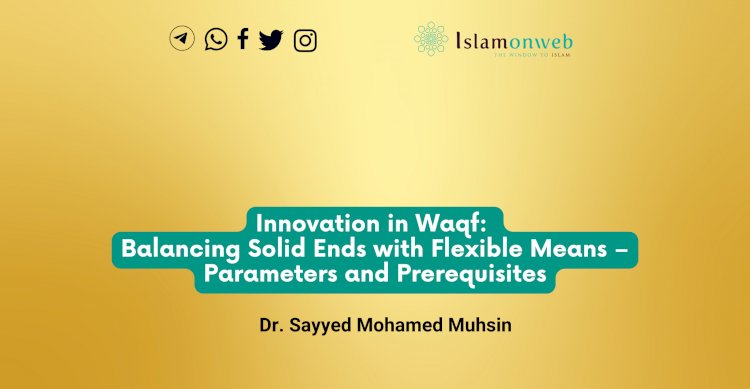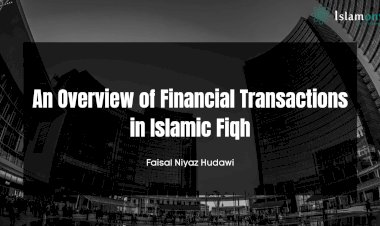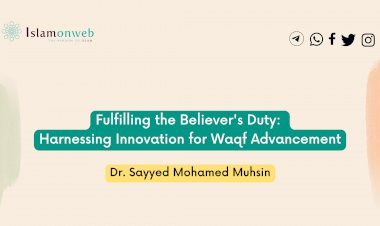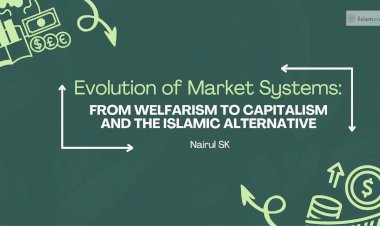Innovation in Waqf: Balancing Solid Ends with Flexible Means – Parameters and Prerequisites
Solid Ends and Flexible Means
Ends of waqf are solid and synthetic as put forth in Maqāṣid al-waqf. Nevertheless, the means to reach the ends are flexible and adjustable according to the needs of the time. Waqf, throughout Islamic history, has been open and flexible to accommodate innovation and experiment in novel arenas. Now the world we live in has undergone tremendous transformation and encountered utterly different lifestyles, which as a result, demands commensurate adjustments and modifications in waqf practises as well. That adjustment, innovation, and fresh insights are crucial in fulfilling Maqāṣid Sharīʿah in general and Maqāṣid al-waqf in particular. This change is noticeably inevitable due to the negligence, malpractices and mismanagement that have occurred in endowment fields for the last few centuries. By this change, the Muslim ummah can lay the foundation for restoring its lost legacy of scholarship and leading role in educational achievements, intellectual contributions and scientific inventions, let alone taking care of needy fellow brethren. These changes and innovations might sometimes be unconventional but can be welcomed and accommodated as long as they are within the jurisprudential parameter and maqāṣid sharīʿah framework.
The nobility and sublimity of the objectives will not necessarily make more profound impacts if they are not met with adequate, efficient and timely mechanisms and dynamism. In the context of waqf, innovation does not mean shaking the base, which is the objective of waqf. Instead, it means only how to engage and leverage their utilities by experimenting with new methods and frameworks. Otherwise, several meritorious acts will end up as mere rituals leaving no impact on religious, individual and social lives. This kind of innovation is a duty of every competent scholar towards the society he lives in.
Consideration of benefit and welfare people and meeting the needs of designed beneficiaries are the crucial factors in the legislation of waqf. Islamic jurisprudence of waqf confirms this fact in its several rulings. For example, movable and extinguishable properties can be endowed. Likewise, waqf properties can be replaced to meet the needs. In addition, particular beneficiaries can be preferred to others due to the situation.
Parameter of Innovation
Fiqh can be summarised as the achievement of benefit and repulsion of harm. By placing waqf in the matrix of fiqh, the ruling can be inferred as all that brings benefit to the waqf needs to be preserved and promoted. All that causes harm to waqf needs to be prevented and eliminated. Undoubtedly, the benefits in this world refer to its maximum utility by increasing its income and facilitating the beneficiaries. The mechanisms of waqf utilization need to be reexplored in the wake of radical and substantial changes. The world has witnessed unprecedented headways in several sectors of life over the last few decades.
Sharīʿah has been constituted of wisdom and benefits for people here and hereafter. Sharīʿah is full of justice, mercy, benefit and wisdom, as Ibn al-Qayyim explained.[i] Maqāṣid Sharīʿah could be either the objectives or ends. It could also be the rulings that help realise those objectives and ends. In addition, it could be the intentions of legally competent individuals and their goals, as Ibn Bayyah described.[ii] The negligence towards the goals and wisdom imbued in the injunctions or proscriptions of Allah is the portrayal of a lack of vision and discernment about the positioning of al-Sharīʿah.[iii]
Innovation does not mean making an impact at any cost. In Islam, the end does not justify the means. Instead, the means should also be in conformity with Islamic teachings. Innovation and revival of waqf is a noble and well-rooted goal from Islamic jurisprudence and maqāṣid sharīʿah perspective. This goal should be achieved via the tools and media approved by Sharīʿah. Put simply, it needs to be without derailing from the waqf-related jurisprudential rules and Sharīʿah’s objectives.
Any innovation in waqf needs a solid and systematic jurisprudential grounding because waqf, first and foremost, is an Islamic religious institution. The innovation should focus on realising the objectives of waqf. It entails the creative role of the institutional and legal systems.
Prerequisites of Innovation
The comprehension of Sharīʿah objectives is crucial for the proper and efficient Islamic legal interpretation, also, it helps in choosing and benefitting from the works of early scholars in terms of their suitability in contemporary times. It indeed facilitates finding Islamic juristic perspectives on new issues which do not have a clear and direct ruling from the Quran and Sunnah. In addition, it appears inevitable in the prioritisation between conflicting interests. This juristic skill is inevitable in introducing and producing any innovation in waqf. Not only in waqf, but this skill is also unavoidable for alteration, adjustment and innovation in any field as well.
In the wake of introducing the innovations, the authorities should heed people’s concerns in digesting the new methods and confirming their validities from a religious perspective. As part of exploring the innovations, the various advanced waqf practices in different regions must be studied. People’s trust in waqf and its administration is crucial in bringing about changes and innovation in waqf. People need to be adequately enlightened about the potentiality of waqf. For that authoritative religious leadership is crucial.
The facts below are the prerequisite for the revival and innovation of the waqf:
- Retrieval of misappropriated waqf.
- Documentation of undocumented waqf properties.
- Mass awareness about the importance of waqf.
- Designing a juristic framework for Sharīʿah compliant application.
- Scholarly research and scientific studies exist in the state of waqf in each region because each area got its own stories.
- Planning because planning will take time and not-planning will take more time.
- Winning the trust of people.
- Publicity and mass awareness.
- Conducting surveys among the beneficiaries.
- Formulation of proper policies.
- Adequate infrastructure for governance purposes.
- Honest, trustworthy and governance free from corruption and mismanagement.
- Waqf should be protected from being prone to aggravated risks.
- Attending to the needs of vulnerable strata of society.
(This article is part of a research work which was originally published on AWQAF Journal, (44). pp. 14-52. ISSN 1609-4662, published from Kuwait).
Endnotes
[i] Ibn Qayyim al-Jawziyyah, Iʿlām al-Muwaqqiʿīn ʿan Rabb al-ʿĀlamīn, (Dār ibn al-Jawzī, 1423 AH), vol 4, p 337.
[ii] Ibn Bayyah, ʿAlāqat Maqāṣid al-Sharʿ bi Uṣūl al-Fiqh, p. 14-21.
[iii] ʿAbd al-Malik bin ʿAbd Allāh Al-Juwaynī, al-Burhān fī Uṣūl al-Fiqh (Beirut: Dār Iḥyā’ al-Turāth al-ʿArabī, 2002), vol 1, p. 91.
About the author
Sayyed Mohamed Muhsin, PhD is Assistant Professor of Islamic jurisprudence at the International Islamic University Malaysia (IIUM), Kuala Lumpur. He also serves as Editor-in-Chief of Islamonweb-English (https://en.islamonweb.net/)
Disclaimer
The views expressed in this article are the author’s own and do not necessarily mirror Islamonweb’s editorial stance.
























Leave A Comment